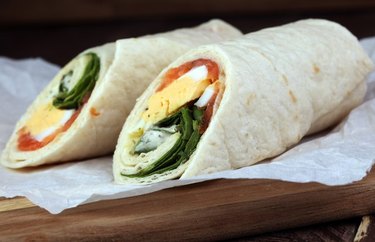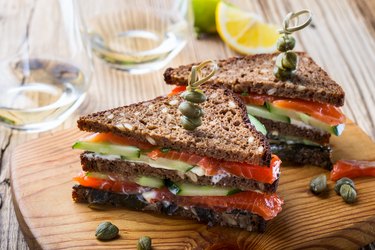
Quick, easy and portable, there's no doubt that sandwiches are convenient (and perfect for when we've got cooking fatigue). But while you can stack a PB&J or a turkey club in five minutes flat, let's be honest — these sandwich staples don't always satisfy your hunger.
To stave off the stomach rumbles, a sandwich must be robust enough to stand alone as a proper meal. That means it should supply a balance of protein, fiber and healthy fats. These six healthy sandwich recipes pack more than 20 grams of protein and check all the boxes for a happy belly.
Video of the Day
Video of the Day
1. Smashed Chickpea Club Sandwich
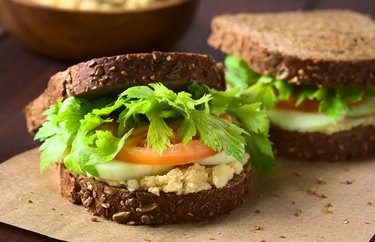
- Calories: 524
- Protein: 21 grams
With healthy helpings of red onion, cucumber, microgreens and tomatoes, this high-protein sandwich will easily help you meet your daily veggie target. Smashed chickpeas — which provide a protein punch and gut-friendly fiber (17 grams per serving) — round out the satiating sandwich filling, guaranteed to keep your appetite in check until dinner.
Meanwhile, pantry staples like a splash of lemon juice and a drizzle of olive oil offer a ton of taste.
Get the Smashed Chickpea Club Sandwich recipe and nutrition info here.
2. Lightened-Up Chicken and Fig Sandwich
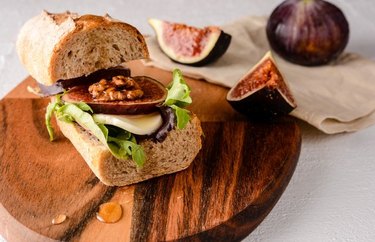
- Calories: 427
- Protein: 40 grams
This beautifully balanced baguette with a balsamic reduction may seem fancy (think: Parisian bistros), but it's a breeze to make (literally five minutes from prep to plate). Fresh figs and chèvre, a cheese made from goat's milk, supply the sweet and savory factor while baby spinach lends an extra layer of texture and a host of nutrients. Use rotisserie chicken to save more time.
Get the Lightened-Up Chicken and Fig Sandwich recipe and nutrition info here.
3. Rainbow Sandwich Pinwheels
- Calories: 438
- Protein: 26 grams
Stuffed with hard-boiled eggs, cheddar cheese and creamy avocado, these simple sandwich rolls deliver all the healthy carbs, fats and protein you need in one palate-pleasing package. And with the contents neatly wrapped in a whole-wheat tortilla, these protein-packed pinwheels are practically spill-proof and ideal for grab-and-go lunches.
Get the Rainbow Sandwich Pinwheels recipe and nutrition info here.
4. Florentine Grilled Cheese Sandwich
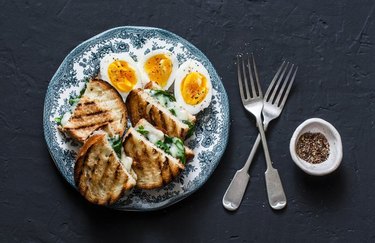
- Calories: 439
- Protein: 28 grams
There's nothing like an ooey-gooey grilled cheese to stir up care-free childhood memories. The classic comfort food gets a grown-up upgrade in this savory sandwich thanks to the complex, nutty notes of Gruyere cheese paired with poached eggs (melty cheese combined with runny yolk = next-level gooeyness).
Get the Florentine Grilled Cheese Sandwich recipe and nutrition info here.
5. Smoked Salmon and Caper Sandwich
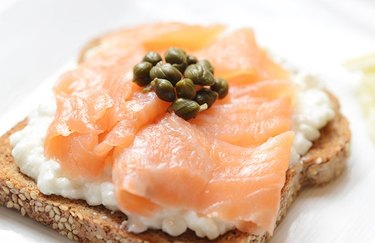
- Calories: 279
- Protein: 33 grams
Just four simple ingredients stand between you and this satiating smoked salmon sandwich, which serves up a slew of heart and brain-supporting omega 3s. A healthier twist on lox and cream cheese, this high-protein sandwich sacks the starchy bagel for a slice of fiber-rich whole-grain toast and cans the cream cheese for high-protein, low-calorie cottage cheese. That means you'll still get the flavors you love but with more nutritional value.
Get the Smoked Salmon and Caper Sandwich recipe and nutrition info here.
6. Black Bean Melt With Slaw
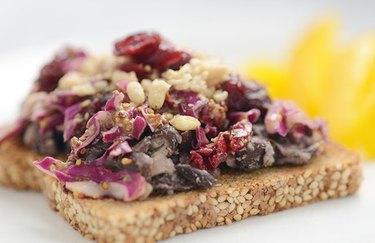
- Calories: 455
- Protein: 32 grams
Looking for a way to use that can of black beans in the back of your pantry? Sweet honey, tart cranberries and savory Swiss cheese combine to create a feast for the senses in this mouthwatering black bean melt that boasts 32 grams of protein. Shredded red cabbage made into a succulent slaw with red wine vinegar and mustard adds great crunch.
Get the Black Bean Melt With Slaw recipe and nutrition info here.
